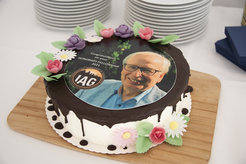Lifetime achievement in science honored
Dr. Klaus Peter Jochum of the Max Planck Institute for Chemistry receives the highest award of the International Association of Geoanalysts (IAG)
The International Association of Geoanalysts (IAG) has awarded Dr. Klaus Peter Jochum an Honorary Fellowship for his years of service and numerous outstanding contributions to geoanalytical research. “This highest honor is awarded only to outstanding scientists. It recognizes the enormous contribution Jochum has made to geoanalytical science over the course of his life,” emphasized IAG Vice President Dr. Regina Mertz-Kraus at the award ceremony. Because of the corona restrictions, the award ceremony did not take place as usual within the framework of the international Geoanalysis Conference in Freiberg but rather in hybrid format at the Max Planck Institute for Chemistry in Mainz.
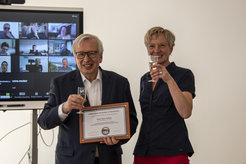
IAG President Prof. Jacinta Enzweiler from the University of Campinas in Brazil, who joined via Zoom, thanked Jochum for his decades of dedicated work. IAG Vice President Regina Mertz-Kraus from the Institute of Geosciences at the Johannes Gutenberg University Mainz presented him with the honorary membership certificate on his behalf: “Dr. Jochum's many years of research in the field of geoanalytical method development and reference materials as well as his commitment to the promotion of junior scientists aligns perfectly with the tasks and goals of the IAG”.
“My scientific career began over 50 years ago with the analysis of meteorites and lunar samples. Over the years, my research area evolved from geochemistry of the Earth’s mantle and biogeochemistry to paleoclimate research. I now focus on the study of foraminifers. My thanks go to the Directors of the MPI for Chemistry – Heinrich Hintenberger, Friedrich Begemann, Albrecht Hofmann, Meinrat Andreae, and Gerald Haug – who have always supported me in my research topics,” Jochum emphasized in his speech. He has always been committed to the development and improvement of analytical methods for characterizing sample material. That’s how Jochum eventually came to IAG. “Through my IAG membership, I was able to learn a lot about metrology and the science of measurement,” says Jochum, who first attended a Geoanalysis conference in 2000 and has not missed any of the meetings since. He has been actively involved as an IAG council member for many years.
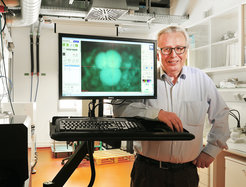
Hand tool developed for reliable geological and environmental research
During his time at the MPI for Chemistry, Jochum developed various geoanalytical methods such as multi-element isotope dilution analysis using spark source mass spectrometry (SSMS) in collaboration with H.-J. Knab, inductively coupled plasma mass spectrometry (ICP-MS) in collaboration with Matthias Willbold, and the single-shot method with femtosecond laser ablation mass spectrometry (fs-LA-ICPMS) in cooperation with Ralf Schiebel.
The MPI-DING reference glasses were developed under Jochum’s direction in order to improve the accuracy of the analytical results. These are now used internationally and have been certified since 2000. With the establishment of micro- and nano-trace element analysis of solids, the reference materials previously used for geological and environmental research were no longer sufficient because there were only a few homogeneous samples certified according to ISO guidelines.
The MPI-DING glasses serve as reference samples for the microanalytical investigation of extraterrestrial material and foraminifers, the analysis of ocean floor samples, the determination of impurities in glass sponges, the isotopic analysis of minute melt inclusions in Hawaiian basalts, and the determination of the origin of archaeological samples. “Since 1995, the reference glasses have been shipped worldwide more than 600 times. Our MPI-DING glasses are cited in almost 1,000 publications,” says Brigitte Stoll, a long-time member of Jochum’s working group.
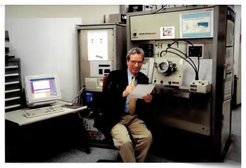
GeoReM database launched from the ground up
Jochum is also the founding father of GeoReM (Geological and Environmental Reference Materials), a unique database for reference samples. “I invested quite a lot of time and energy in literature research, data entry, and control,” recalls Jochum. The database is freely accessible on the Internet. It contains the published data of almost all reference materials of different nature and properties. This is indispensable for reliable analytics in geological and environmental research. “Numerous students have helped us set up the database and have learned a lot about analytical methods and reference materials in the process,” adds Ulrike Weis, who is responsible for the technical support of GeoReM in Jochum’s group.
In addition to all these scientific challenges during his long career at the Max Planck Institute for Chemistry, where he joined as a permanent researcher in 1972 after previous fellowships, Jochum has always been committed to the training of junior scientists. He has welcomed and trained many post-docs and PhD, diploma, and master students as well as interns, GirlsDay participants, and “Jugend forscht” award winners in his laboratory and team.
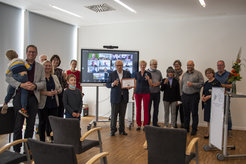
Gerald Haug, Director of Climate Geochemistry Department, therefore also emphasized in his speech: “Scientific curiosity and openness to new things still characterize Klaus Peter Jochum even after more than 50 years in research. To this day, he is always open to inquiries even from foreign fields such as archeology, biology, or medicine and is always ready to discover new things.”
